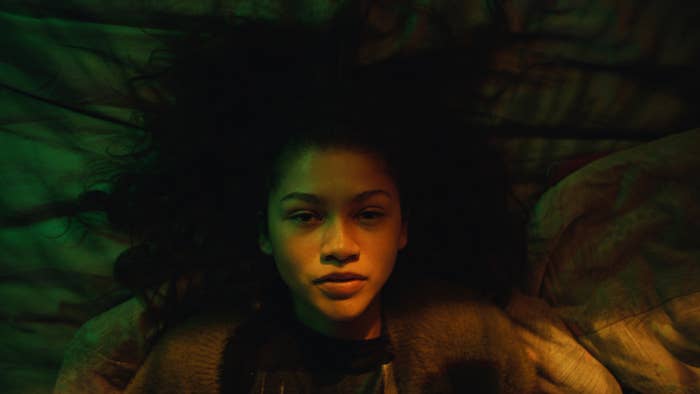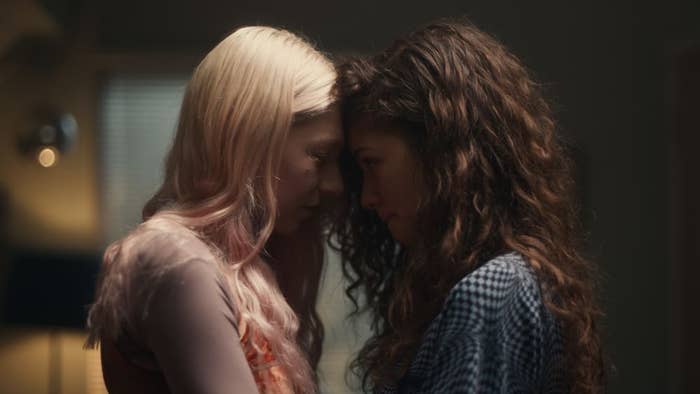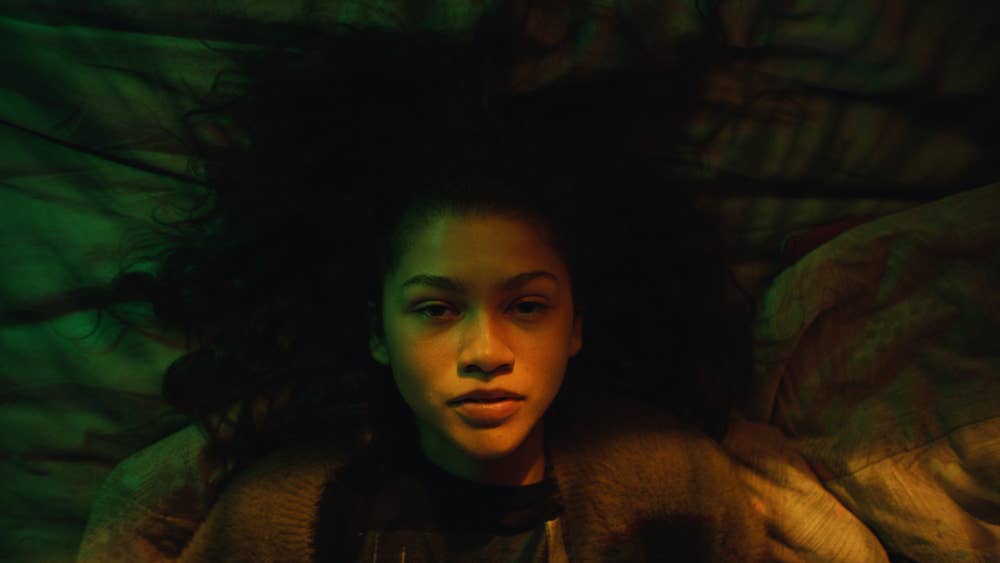
Adolescence can be characterized by a certain loudness. Teenagers’ stratospheric emotional highs and howling lows; their vibrant music and style obsessions; their kindness and their cruelty; their angst and even their stillness—everything culminates in an urgent, clamorous expression of what’s heightening within. Even when the messaging is illegible, the demand is clear: See me. Hear me. Feel me. Writer/director Sam Levinson’s new A24-produced series Euphoria embodies the same intensity, glamour, and volatility that it depicts in the lives of its teenage characters; it emphatically demands to be seen, though its identity is still taking shape.
[Ed. Note: The first four episodes of Euphoria were screened for this piece; light spoilers ahead.]
Narratively, Euphoria follows a familiar format: a disparate troupe of high schoolers each navigates complicated forays into sex, drugs, and relationships that intersect dramatically. The show has drawn comparisons to teen dramas Skins and Degrassi (the latter of which is not minimized by Euphoria’s appointment of Drake as an executive producer, but more on that later), but the situations are as grim and graphic as a Larry Clark film, as disingenuously glitzy as The O.C., and as soapy as Riverdale. Euphoria’s sexual brutality and other physical violence is certainly more hardcore than in any of the aforementioned series, to a degree that many will find excessive, even for a channel like HBO. For example, a “fantasy” sequence in Episode 2 shows a teenage girl being chloroformed, abducted and bound in a trunk by an older man, who is then shot in the head at point-blank range—all for a scene that doesn’t actually happen. The show’s abundance of high school nudity is also jarring (the pilot sees two teenage girl characters go topless, and that’s to say nothing of the 30-plus penises you’ve heard about) and arguably unnecessary to the story. More narratively defensible but certainly not any easier to digest is a gratuitous interaction in Episode 3 involving a female character and a micropenis. Obviously HBO is not TeenNick, and that isn’t a problem in itself, but to write in such moments with no clear reason for their inclusion makes them feel less than justified.
At the center of Euphoria is Rue, a smart but despondent drug addict played compassionately by Zendaya, who alternately oozes languor and unrest with equal depth. The story of Rue’s addiction is told with more nuance than other plotlines, largely because it draws from Levinson’s own experiences as a recovering addict. “I’m playing Sam,” Zendaya tells Complex. “The way Rue’s brain is wired [is] not something that you can just make up and expect people to connect with it and understand it… [It’s] because of [Sam’s] vulnerability, and him allowing himself to go to those places and revisit those memories.”
Though it’s valid to fret about those who might find Rue’s drug use instructional—like when she walks the audience through how to cheat a drug test or demonstrates how to crush pills using an iPhone and a dollar bill—Levinson insists that authenticity was the priority.
“I’m very cognizant of how [addiction] is portrayed on-screen,” he says. “There’s always that fine line [between] what's glamorizing versus what's being honest about it. People don’t get addicted to drugs because they’re not exciting or they don’t fulfill some sort of missing piece. Then they will destroy your life, and they’ll destroy your family and everything around you that you love and care about.
“I didn’t want to pull any punches with it. I think people could smell the bullshit when it’s like a preachy after-school special.”

Authenticity is the root of the cast’s connection to the show as well. The nine central actors, whose ages range from 15 to 24, recall seeing themselves reflected in the script. “While our high school experiences might not line up exactly with what our characters were doing, [we] deeply understand what feelings our characters are driven by,” says Hunter Schafer, the 20-year-old model making her acting debut as Jules.
For fellow model and first-time actor Barbie Ferreira, whose introverted Kat finds a secret life online, the character’s arc hit close to home. “The motivation behind everything is so apparent to me because I went through a similar thing at almost the exact same age,” she says. “It was different situations but the same circumstances—this anonymity, and just not feeling like you're worthy of anything.”
To cope with the weight of the material, the actors turned to each other for emotional support on- and offscreen, but their roles presented painful challenges nonetheless. “It was definitely grueling,” says Jacob Elordi, who plays verbally/physically violent jock Nate, and who—according to Alexa Demie, who plays Nate’s girlfriend Maddy—would “go home and cry” after difficult scenes. “I would end up going home and looking at myself in the mirror and having to question what I was doing,” he says, adding that his saving grace was support from Levinson and his fellow castmates.
“When you’re shooting something that’s so emotionally taxing, [it’s important] to have people that are there that take care of you,” says Maude Apatow, who plays Rue’s childhood friend Lexi. “We had a very good support system on set.”
Levinson also enlisted intimacy coordinators to ensure the actors’ physical and emotional safety during sensitive scenes. “There are people who advocate for the actors and help negotiate these scenes because they're really vulnerable,” he explains, “I’m really proud of the environment we created on set.”
To those wondering about the specifics of Drake’s contributions to the show, you’re not alone. According to the cast, Drizzy wasn’t actively involved in the production; they say he visited the set only once. Instead, his role sounds something akin to an ambassador. According to Levinson, “Drake has been a champion of this show from the beginning, in terms of marketing, in terms of what it means culturally.”
“It’s good to know we have a big name to help us because it is a different thing than HBO has ever done before,” Zendaya says. “It's important to have those champions.”

The genesis for Euphoria began during production on Levinson’s 2018 feature debut, Assassination Nation, which also centers around high schoolers and features similar motifs but motivated him to dig deeper. “I wrote the pilot the day after I wrapped shooting,” he recalls. “[Euphoria] was really born out of Assassination Nation in the sense of, what if we were to take some of the more expressionistic aspects, [but] grounded in reality, with very real issues?” As for high school as a vehicle for storytelling, Levinson says, “There’s something about being young and being a teenager that is still very much inside of me. It’s so difficult to express how you feel about something that I became fascinated by making a show about characters that are unable to articulate how they feel. I wanted to do something that dealt with that, and then also dealt with addiction, which is something that I struggled with for many, many years, and, also, the anxiety of being young.”
Levinson’s compassion for the adolescent experience is convincing, and the vulnerability of his cast makes Euphoria watchable even if it is frequently far from pleasurable. Beyond its performances, the show’s next most palatable offering is its visual aesthetic. The hyper-stylized look of Euphoria feels proportional to the high drama of everything else the show lays out; its cinematography is saturated with neon blues and pinks, atmospheric night scenes, rich contrast, and plenty of glitter. Overcooked cutaway scenes and elaborate camera work, while showy, suggest a director exploring and honing his aesthetic identity.
Euphoria doesn’t care for subtlety. In the spirit of adolescence, the show’s theatrics invite head-scratching, pearl-clutching, and hand-wringing, but its emotional underpinnings will make you feel invested in its development. Its footing starts to feel sturdier in Episode 4, the halfway point of the season and its most coherent hour we’ve seen so far. Its creator and cast are unanimous in their feeling that everyone has something to gain from it.
Fifteen-year-old Storm Reid, who plays Rue’s younger sister Gia, envisions an audience of teens and parents alike. “I hope it's just not one type of person or one type of group watching Euphoria,” she says. “Even though it’s centered around us teenagers, I feel like we're trying to talk to everybody. But just through a teenager’s lens.”

